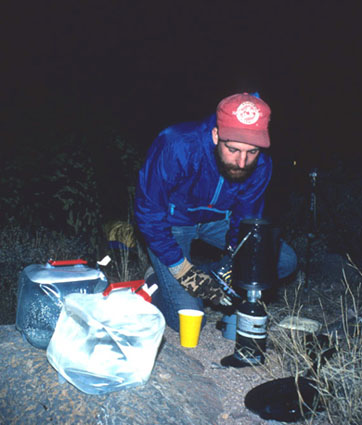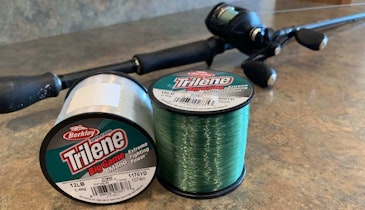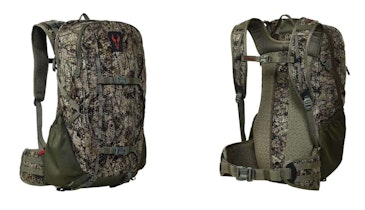 Dehydrated foods are lightweight, convenient, and nutritious. Today’s backpack-friendly portable stoves make prep a snap. |
During the average day bowhunters can burn serious calories—especially at high altitudes. Maintaining peak performance means eating right, not just putting away empty calories.
Carbohydrates are important staples, slow-yield fuel utilized for long-term energy, including starches and complex sugars found in potatoes, grains, breads, and pastas. Simple sugars provide instant energy, but they have no staying power. Fats and cholesterol are high-energy nutrients with 2.5 times more energy than sugars, preventing “crashing” when exerting yourself. Proteins found in meat, some grains, and legumes (beans) are important for repairing muscle damage after rigorous exercise, or skin after sunburn. They also containing some complex sugars for energy. These are the basics.
Packing & Preserving
Truck camping with coolers makes life easy. Pre-cooking nutritious casseroles and stews and freezing them in storage containers at home makes preparation no more difficult than warming, supplementing with canned vegetables and bread. To simplify grilling meat, place steaks in resealable plastic bags, adding marinades and sauces before freezing.
During cold winter hunts open coolers at night to re-freeze contents, closing by day to maintain interior cold. During warmer early-season hunts, use big 120- to 150-quart coolers, dividing them with a smaller “lunch-box” cooler. One side holds frozen food covered with dry ice, newspaper added for insulation, the other side items that shouldn’t freeze but need to remain cool. The smaller cooler holds cube ice, great for cold drinks, but also prolonging the life of dry ice. Move coolers into shade and wrap them with old sleeping bags for better insulation during midday.
Nitrate-cured meats aren’t spoil-proof, but last longer if kept in a cool spot like a spring. Bacon can also be used to fry rabbit, game meat or mountain trout. Smoked sausages and ham are other alternatives. On warm or prolonged trips look to canned ham, chipped beef, chunk chicken, salmon or foil-packed tuna to add to rice or noodles for extra nutrition and calories.
Cheap & Easy Foods
While backpacking dehydrated foods are lightweight, convenient, and nutritious, though many lack fat. In areas where you must pack water they become impractical. Military MREs (Meals Ready To Eat) are another option in such cases.
For inexpensive grocery-store alternatives look to instant mash potatoes, rice, oriental soup blocks, oatmeal, grits and such for quick carbohydrate fuel. Add dried fruit, nuts, jerky, or peanut butter to improve taste and nutrition. Lightweight foil packages of “noodles/rice & sauce” are widely available and fast to prepare. A small container of olive oil or butter’s worth the extra weight, adding energy-packed fat and flavor.
Nut-laden candy bars, trail mix, dried fruit and nuts, are all good quick-fuel choices between meals, as are balanced sports bars. Sardines and kipper snacks, as well as jerky, offer high energy snacks that are nutritionally sound.
Water & Other Fluids
A filter pump assures safe drinking water. Commercial chemical tablets, neutralized after decontamination with vitamin C tablets, are another option. Instant coffee or tea bags are easily packed, but powdered sports drinks are more important, replenishing vital electrolytes and minerals when working up a sweat to help prevent muscle cramps. Always drink plenty of fluids as dehydration can make you sluggish, even terribly sick.
Long hours, challenging terrain, and poor food can leave you feeling drained and defeated. Eating well eases the strain and keeps you in the game.






